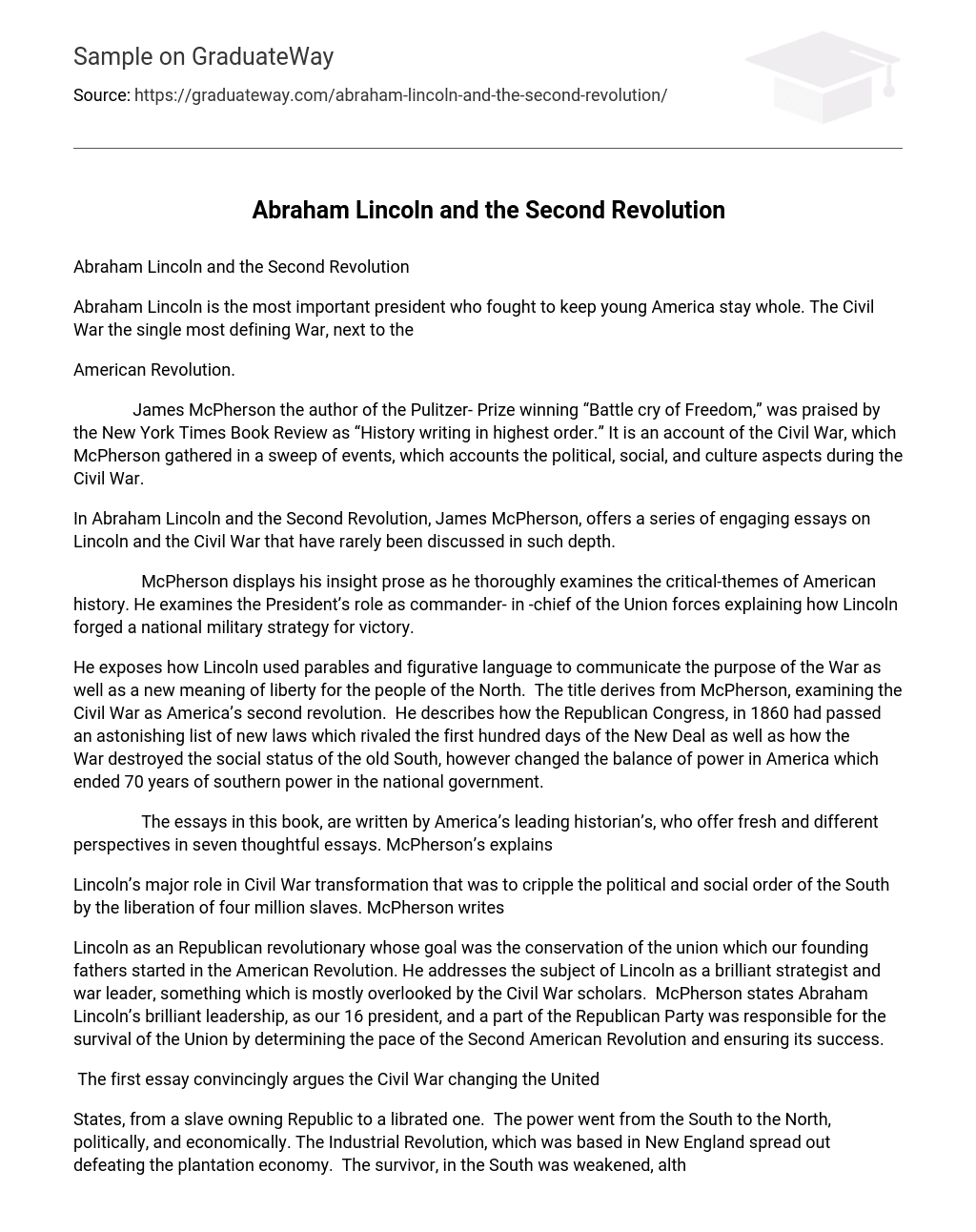Abraham Lincoln is the most important president who fought to keep young America stay whole. The Civil War the single most defining War, next to the
American Revolution.
James McPherson the author of the Pulitzer- Prize winning “Battle cry of Freedom,” was praised by the New York Times Book Review as “History writing in highest order.” It is an account of the Civil War, which McPherson gathered in a sweep of events, which accounts the political, social, and culture aspects during the Civil War.
In Abraham Lincoln and the Second Revolution, James McPherson, offers a series of engaging essays on Lincoln and the Civil War that have rarely been discussed in such depth.
McPherson displays his insight prose as he thoroughly examines the critical-themes of American history. He examines the President’s role as commander- in -chief of the Union forces explaining how Lincoln forged a national military strategy for victory.
He exposes how Lincoln used parables and figurative language to communicate the purpose of the War as well as a new meaning of liberty for the people of the North. The title derives from McPherson, examining the Civil War as America’s second revolution. He describes how the Republican Congress, in 1860 had passed an astonishing list of new laws which rivaled the first hundred days of the New Deal as well as how the War destroyed the social status of the old South, however changed the balance of power in America which ended 70 years of southern power in the national government.
The essays in this book, are written by America’s leading historian’s, who offer fresh and different perspectives in seven thoughtful essays. McPherson’s explains
Lincoln’s major role in Civil War transformation that was to cripple the political and social order of the South by the liberation of four million slaves. McPherson writes
Lincoln as an Republican revolutionary whose goal was the conservation of the union which our founding fathers started in the American Revolution. He addresses the subject of Lincoln as a brilliant strategist and war leader, something which is mostly overlooked by the Civil War scholars. McPherson states Abraham Lincoln’s brilliant leadership, as our 16 president, and a part of the Republican Party was responsible for the survival of the Union by determining the pace of the Second American Revolution and ensuring its success.
The first essay convincingly argues the Civil War changing the United
States, from a slave owning Republic to a librated one. The power went from the South to the North, politically, and economically. The Industrial Revolution, which was based in New England spread out defeating the plantation economy. The survivor, in the South was weakened, although not overcome which improved the situation of the blacks, however not their equality. McPherson’s seems most interested in the change from the philosophy of negative liberty, the freedom from government oppression, the right to one of positive liberty, the right to protection, and the guarantee by the federal government.
The second essay discusses Lincoln as the leader of the revolution.
McPherson argues “was a pragmatic revolutionary.” The second revolution was brought by Lincoln and was caused by his accurate necessities and not by an ideological connection to the revolution. Lincoln held the strong belief of democracy, and the Civil war happened defending his belief.
In the third essay, “Lincoln and Liberty” McPherson discusses Lincoln thoughts on the people holding negative liberty saw struggle for positive liberty as tyrannical.
Republicans wanted to restrict and destroy the rich Southerners holding slaves and to use
This restriction by government action if that is what it takes. Lincoln as a military commander is a terribly neglected topic among historians, McPherson argues, and sets out to solve this overlook in the following essay. He concludes, Lincoln’s most important contribution was his fierce hold on the doctrine of Unconditional Surrender. The Unconditional Surrender issue also returns in the 6th essay, which compares Lincoln to the Northerners who were clear about their goal of fighting as Lincoln.
The fifth essay discusses Lincoln’s Rhetoric and the use of Metaphors. In comparison with Jefferson Davis, McPherson concludes Lincoln’s use of metaphors in his writings and speaking were superb compared to Davis. McPherson then agrees with David Potter, that the South would have maintained their independence if Lincoln was their leader.
The book weakens the narrative, making it a collection of essays than a focused scholarly book. The final essay repeats the discussion about Isaiah Berlin’s thoughts of the positive and negative liberty; before he changes to another theme. The theme, the turning away from positive to negative liberties returning to negative liberty during the reconstruction of the South. Republicans, during reconstructions had to use the military in order to force the equality of the blacks to an unyielding South. The disillusionment of the reconstruction resurrected the fear of government tyranny, and in turn left the South with racist policies that were left to solve for another Century.
-Reference Site-
1. Abraham Lincoln and the Second Revolution (Paperback) by James M. McPherson. Publisher Oxford University Press, USA; reprint edition, June 4, 1992.





